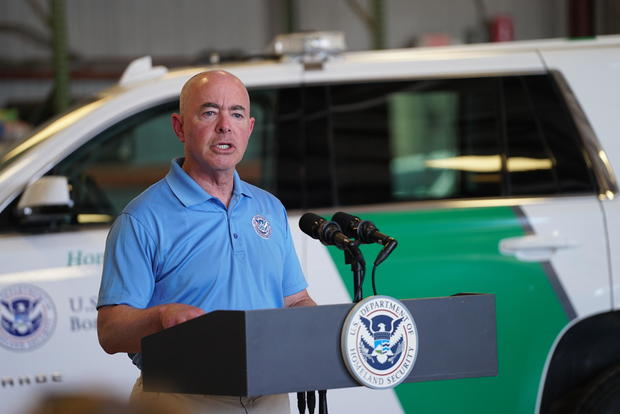McAllen, Texas — Secretary of Homeland Security Alejandro Mayorkas on Tuesday forcefully denounced the connection some Republican lawmakers have made between the national baby formula shortage and the availability of formula at migrant holding facilities along the U.S.-Mexico border.
“We are taking care of the basic needs of people in our custody. We are taking care of the basic needs of babies, and that includes baby formula,” Mayorkas told CBS News during an interview Tuesday near the Texas border. “The connection between honoring our humanitarian and legal obligation to those babies and a supply issue in the interior of the United States is false and repugnant.”
Nicole Sganga
Conservative outrage over the availability of baby formula at border facilities first emerged last week after Congresswoman Kat Cammack, a Republican from Florida, published photos juxtaposing an alleged stockpile of baby formula at a Customs and Border Protection (CBP) processing site and a half empty store shelf.
“This is what America last looks like,” Cammack wrote, using a phrase she repeated during several Fox News interviews this week.
In one of those interviews, Cammack said “no one is arguing that we shouldn’t have (formula) for babies at the border,” but suggested, citing no evidence, that the Biden administration was prioritizing the distribution of formula to migrant babies amid the national shortage.
Several conservative politicians echoed Cammack’s statements, including Texas’ Republican Governor Greg Abbott, who accused the Biden administration of being “happy to provide baby formula to illegal immigrants coming” while American parents struggled to find baby formula.
There’s no indication the national baby formula shortage is connected to the distribution of formula to migrant babies in U.S. border custody, a claim Cammack clarified she’s not trying to make.
“I have also said repeatedly that even if supplies were diverted from the border to American store shelves, Biden’s formula crisis is so massive that these warehouses’ contents would do little to relieve the incredible shortage,” Cammack said in a statement.
There’s also no evidence that the Biden administration has prioritized migrant babies over U.S.-born children in terms of formula distribution.
The nationwide formula shortage follows a major recall under the Similac, Alimentum and EleCare labels and supply chain challenges stemming from the pandemic. Bacterial infections among infants who drank formula from an Abbott Nutrition plant in Sturgis, Michigan, first prompted the February recall. Two babies died of bacterial infections as a result, while others were hospitalized.
To address the shortage, the Biden administration announced an expansion of formula products that can be purchased with benefits from the Special Supplemental Nutrition Program for Women, Infants and Children (WIC) program. The White House is also partnering with manufacturers to boost importation of formula from abroad.
President Biden vowed to reporters Friday that there should be “significantly more formula” on store shelves in “a matter of weeks.”
Dr. Pritesh Gandhi, the chief medical officer at DHS, said the U.S. government has a legal obligation to provide age-appropriate food and water to migrants, including babies traveling with their parents, while they are in U.S. custody.
“But importantly, there are important American values that we have to follow. We are talking about children. Young children and babies,” said Gandhi, who is a pediatrician.
“We have a public health imperative, a medical imperative and a values imperative to provide appropriate food and water to those that we care for, just like we do for every other child in this country,” Gandhi continued.
The U.S. government has routinely provided baby formula to migrant infants processed along the Mexican border for years, under both Republican and Democratic administrations.
A landmark court settlement known as the Flores agreement, approved by a federal district court in California in 1997, requires the federal government to offer migrant children basic necessities, including “access to toilets and sinks, drinking water and food as appropriate.”
CBP rules enacted in 2015 direct agents to provide age-appropriate food to migrants, including “formula and baby food.” Legal experts also say the U.S. Constitution would bar the government from withholding food to migrant babies in U.S. custody.
“The guarantee of Due Process in the Fifth Amendment requires that immigrants held in detention be treated no worse than a person held in jail awaiting trial. That includes the requirement that the government feed people in its custody,” said Aaron Reichlin-Melnick, senior policy counsel at the American Immigration Council.
The number of minors processed along the U.S.-Mexico border is also substantially less than the number of babies born in the U.S. More than 3.6 million babies were born in the U.S. in 2020, according to government data.
In April, nearly 55,000 migrant parents and children traveling as families entered U.S. border custody, according to government figures, which do not indicate how many of the minors were babies. Additionally, U.S. border officials processed 12,221 unaccompanied children, most of whom are historically teenagers.
Neha Desai, one of the lawyers representing migrant children in the Flores court case, said the withholding of baby formula would be a breach of the settlement. But she stressed that the care of migrant children should not be politicized.
“Suggesting that detained babies are being provided baby formula at the expense of other babies in this country is morally repugnant and flagrantly factually inaccurate,” Desai said. “Furthermore, this is a deeply disturbing reflection of the state of politics in this country.”
Mayorkas on Tuesday echoed Desai’s sentiment.
“I think immigration policy has been highly politicized for too long, and the politicization of it is more extreme now than it has been in the past,” Mayorkas said.
Zoe Christen Jones contributed reporting.

